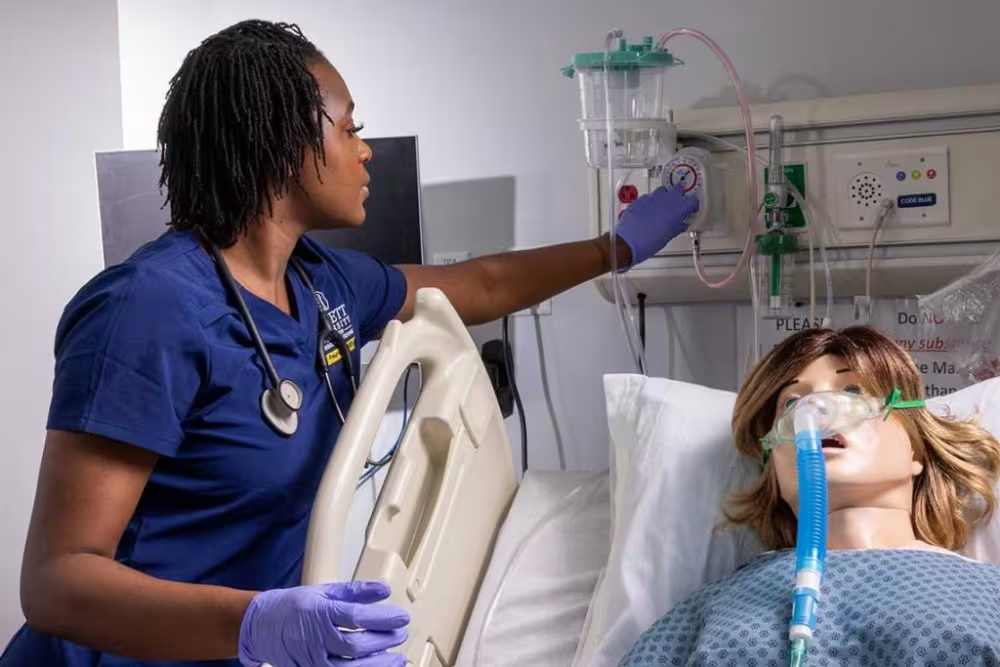How to Become a Nurse With a Biology Degree: Fast-Track Your Career Change
Each blog post is dated and contains accurate information as of that date. Certain information may have changed since the blog post publication date. If you would like to confirm the current accuracy of blog information, please visit our ABSN overview page or contact admissions at (866) 483-8705.
Are you wondering how to become a nurse with a biology degree? At Averett University, you can transition from a biology degree to nursing through the Accelerated BSN program. Biology can give you a leg up in the nursing program while you change career paths.

All nurses need a nursing degree, but you can still become a registered nurse (RN) if you have a biology degree without returning to school for another four years. In fact, a biology degree provides an excellent foundation for a nursing career.
You can leverage your biology degree toward earning a Bachelor of Science in Nursing (BSN). When considering how to become a nurse with a biology degree, one of the first things to figure out is which nursing program is best for your situation.
The most efficient way to become a nurse with a biology degree is to enroll in Averett University’s Accelerated BSN (ABSN) program in Norfolk, Virginia. The ABSN program allows you to leverage your previous bachelor’s degree to earn a BSN in as few as 16 months.
Learn how to transition from a biology degree to nursing, including the steps you’ll follow and the advantages of starting with a biology background.

Is nursing school hard? Learn more about the nursing school experience.
Can You Become a Nurse With a Biology Degree?
Many students choose biology as an undergraduate major with hopes of becoming a doctor or scientist. After graduation, however, students sometimes decide not to pursue those careers.
There are other career options, including nursing. Can you become a nurse with a biology degree? Absolutely, but you’ll need to return to school before jumping into the nursing field. Fortunately, you can use your existing knowledge of the life sciences as a foundation for your nursing studies.
Steps to Become a Nurse With a Biology Degree
Learning how to become an RN with a biology degree starts with understanding the nursing school admissions requirements for accelerated BSN programs.
1. Meet the Admissions Requirements
You don’t need prior healthcare experience to enroll in the Averett ABSN program, but you must meet the following requirements before beginning the admissions process.
To be eligible, applicants must have a non-nursing bachelor’s degree or at least 60 non-nursing college credits with a minimum cumulative 2.8 GPA.

Prospective students must also:
- Pass the Test of Essential Academic Skills (TEAS) V exam with a score of 65 percent or higher (taken within one year of application).
- Have passed all math and science courses with a grade of “C” or better.
- Have no prior nursing program dismissals (grades below “C” in nursing courses).
- Complete a certified criminal background check.
When you speak with an admissions advisor at Averett, you’ll take a closer look at how to become a nurse with a biology degree. Your advisor will review your unofficial transcripts and determine your eligibility for the program.
Fulfill the Prerequisites
You might need to take prerequisite courses before starting the nursing program. Prerequisites are necessary to ensure all nursing students start with the right foundation for nursing education. Since you’re switching from a biology degree to nursing, it’s possible you’ve already fulfilled some of the prerequisite requirements.
Your admissions advisor will help identify which credits transfer. Remaining prerequisite courses can be completed online through Averett.
Students with prerequisite courses in progress will receive provisional admission into the ABSN program, subject to their successful completion of the remaining prerequisites taken at Averett.

2. Complete Nursing School
The 16-month Averett ABSN program consists of four full-time semesters and 66 total credit hours. The program follows a blended learning model that includes:
- Online coursework that builds a strong foundation of knowledge
- Hands-on labs that instill the skills of nursing practice in a risk-free environment
- In-person clinical placements that allow you to apply what you’ve learned to real patient interactions
Explore the ABSN program at Averett University to learn if it’s right for you.

3. Pass the NCLEX
After graduating, you’ll sit for the NCLEX-RN. This exam tests your understanding of nursing principles and practices to ensure you are fully prepared to practice as a registered nurse. Upon passing the NCLEX, you can obtain your license through your state’s board of nursing and apply for nursing jobs.
4. Apply for Your First Nursing Job
While not guaranteed, ABSN students sometimes receive an employment offer during their clinical placements. Clinicals offer opportunities to work alongside healthcare professionals, allowing you to start building your professional network. The Norfolk area is a great location to begin your career.
Advantages of Transitioning from a Biology Degree to Nursing
Biology is a challenging degree. One of the benefits of switching to nursing is that your biology degree can help minimize the intensity of an ABSN program. You will enter nursing school with a strong background in biology and scientific processes and labs. Also, some of your biology classes might overlap with the required prerequisites.

Frequently Asked Questions
It’s helpful to write down a list of questions to ask the admissions advisor during your first and subsequent phone calls. Some common questions we’re asked include:
Can You Get a Nursing License With a Biology Degree?
It isn’t possible to obtain a nursing license with only a biology degree, but you can use a biology degree as a springboard to transition into a nursing program. By leveraging your prior science education, it’s possible to graduate with a BSN in as few as 16 months at Averett upon successful completion of any prerequisites.
What Is the Best Major for Nursing?
Many future nurses major in nursing during their undergraduate education to earn a BSN. This allows them to sit for the NCLEX without any further education. If you didn’t major in nursing, however, you can still switch to nursing.
A degree in life sciences, such as biology, is well-suited to pursuing a nursing degree. This is because a biology degree, like nursing, requires both mathematics and science classes, as well as labs; however, you do not need a biology or life sciences degree to enroll in the ABSN program at Averett.
Can You Transfer From Biology to Nursing?
It’s possible to transfer from a biology degree to nursing. If you haven’t yet completed your biology degree and know that nursing is a better option for you, you can transfer credits toward earning a nursing degree instead.
At Averett, we require a minimum of 60 non-nursing college credits for transfer students who would like to enter our ABSN program. You may find that some of your credits may also fulfill prerequisite requirements.

How to Prepare for Nursing School With a Biology Degree
Nursing school will be an intense academic experience, which is why it’s helpful to prepare beforehand. After identifying a target start date with the help of your advisor, you should clear your schedule and make arrangements for your tuition and living expenses.
Next, visit your doctor and receive any health screenings you may need, which may include updating required immunizations. Then, visit an American Red Cross location near you and get certified in cardiopulmonary resuscitation (CPR) and basic life support (BLS).
Why Choose Averett University’s ABSN Program?
Averett University’s ABSN program is ideal for individuals with completed biology degrees or at least 60 college credits who would like to switch to nursing. We provide dedicated, personalized support to all our applicants. Your admissions advisor will be your single point of contact, walking you through each step.
Once enrolled, you’ll also have access to our Academic Success Coaches. Your coach can provide personalized support as you work through nursing school and prepare for the NCLEX.
With small class sizes, no waitlist, and three start dates each year, Averett puts nursing education within reach for more students. Contact our admissions team today to get started.
